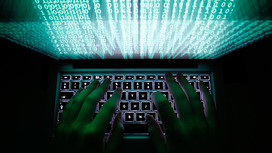(单词翻译:单击)
The Islamic State of Iraq and the Levant (Isis) is the first terrorist group whose members have grown up on the internet. They are exploiting the power of the web to create a jihadi threat with near-global reach. The challenge to governments and their intelligence agencies is huge – and it can only be met with greater co-operation from technology companies.
“伊拉克和黎凡特伊斯兰国”(ISIS)是第一个成员在网络时代长大的恐怖组织。利用网络的力量,他们几乎在全球范围内制造圣战威胁。各国政府和情报机构面对的挑战是巨大的,只有与科技企业展开更深入的合作,才能解决这个挑战。

Terrorists have long made use of the internet. But Isis’s approach is different in two important areas. Where al-Qaeda and its affiliates saw the internet as a place to disseminate material anonymously or meet in “dark spaces”, Isis has embraced the web as a noisy channel in which to promote itself, intimidate people, and radicalise new recruits.
恐怖分子早就会利用网络了。但在两个重要的方面,ISIS的策略和此前的恐怖组织不同。基地组织(al-Qaeda)及其附属组织将网络看成匿名散播材料或者暗中集会的场所,而ISIS把网络当成传播大量消息的渠道,借助它宣传自身、恐吓民众、让新成员变得更为激进。
The extremists of Isis use messaging and social media services such as Twitter, Facebook and WhatsApp, and a language their peers understand. The videos they post of themselves attacking towns, firing weapons or detonating explosives have a self-conscious online gaming quality. Their use of the World Cup and Ebola hashtags to insert the Isis message into a wider news feed, and their ability to send 40,000 tweets a day during the advance on Mosul without triggering spam controls, illustrates their ease with new media. There is no need for today’s would-be jihadis to seek out restricted websites with secret passwords: they can follow other young people posting their adventures in Syria as they would anywhere else.
ISIS的极端分子使用Twitter、Facebook和WhatsApp等消息和社交媒体服务,并且使用他们的同龄人理解的语言。他们发布视频,展示他们攻击城镇、射击或者引爆炸弹的画面,并刻意把视频制作成网络游戏的样子。他们使用世界杯(World Cup)和埃博拉(Ebola)作为话题标签,将ISIS的讯息嵌入范围更广的消息源中。在向摩苏尔城进发的途中,ISIS成员每天发送4万条tweet消息,并且没有触发垃圾消息管控,这表明他们能自如地运用新媒体。今天,想成为圣战分子的人无需寻找访问受限、需要密码的网站:他们可以关注ISIS分子,像任何其他地方的年轻人那样,ISIS分子也会发布自己在叙利亚的“冒险”经历。
The Isis leadership understands the power this gives them with a new generation. The grotesque videos of beheadings were remarkable not just for their merciless brutality, which we have seen before from al-Qaeda in Iraq, but for what Isis has learnt from that experience. This time the “production values” were high and the videos stopped short of showing the actual beheading. They have realised that too much graphic violence can be counter-productive in their target audience and that by self-censoring they can stay just the right side of the rules of social media sites, capitalising on western freedom of expression.
ISIS的领导层了解,在新一代恐怖分子身上,网络赋予他们什么力量。ISIS发布的可怕斩首视频之所以不同寻常,不仅是因为内容残忍无情(我们在伊拉克的基地组织中也看到过这种残忍无情),还因为ISIS吸取了基地组织的经验。这一次,视频的“生产价值”很高,在展现真正的斩首画面前就停止了。他们已经意识到,太多暴力画面可能对他们的目标受众产生反效果。通过自我审查,他们能够恰巧保证不触犯社交媒体网站的规则,利用西方的言论自由。
Isis also differs from its predecessors in the security of its communications. This presents an even greater challenge to agencies such as GCHQ. Terrorists have always found ways of hiding their operations. But today mobile technology and smartphones have increased the options available exponentially. Techniques for encrypting messages or making them anonymous which were once the preserve of the most sophisticated criminals or nation states now come as standard. These are supplemented by freely available programs and apps adding extra layers of security, many of them proudly advertising that they are “Snowden approved”. There is no doubt that young foreign fighters have learnt and benefited from the leaks of the past two years.
在通信安全方面,ISIS和以前的恐怖组织也不同。这给英国政府通信总部(GCHQ)这样的机构造成了更大的挑战。恐怖分子总是有各种方法来隐蔽自己的行动。但今天的移动科技和智能手机让可供选择的方法成倍增加。一度只有最老练的犯罪分子或者国家才能掌握给信息加密或者使信息匿名的技术,如今这些技术已成家常便饭。还有一些免费程序和应用可为他们提供额外的安全保护,其中许多在广告中自豪地宣称获得“斯诺登认证”。毫无疑问,这些年轻的外国战斗人员已从过去一年多的斯诺登爆料中学习并受益。
GCHQ and its sister agencies, MI5 and the Secret Intelligence Service, cannot tackle these challenges at scale without greater support from the private sector, including the largest US technology companies which dominate the web. I understand why they have an uneasy relationship with governments. They aspire to be neutral conduits of data and to sit outside or above politics. But increasingly their services not only host the material of violent extremism or child exploitation, but are the routes for the facilitation of crime and terrorism. However much they may dislike it, they have become the command-and-control networks of choice for terrorists and criminals, who find their services as transformational as the rest of us. If they are to meet this challenge, it means coming up with better arrangements for facilitating lawful investigation by security and law enforcement agencies than we have now.
GCHQ及其姊妹机构军情五处(MI5)和秘密情报局(SIS,英国国内及海外情报机构)如果得不到私营部门更大的支持,包括从主导互联网的美国各大科技公司得到这样的支持,就无法大规模地应对这些挑战。我理解为什么这些公司与政府的关系比较紧张。它们希望成为中立的数据中转站,立于政治之外、或者政治之上。但它们的服务不仅日益成为暴力极端主义或者儿童剥削相关材料传播的温床,也成为向犯罪和恐怖主义提供便利的渠道。无论它们多么不愿意承认,它们都已成为恐怖分子和犯罪分子首选的指挥和控制网络。就像我们其余人一样,那些不法分子也发现它们的服务可以带来巨大改变。如果这些企业要应对这些挑战,就应该做出比现在更好的安排,为安全和执法机构进行合法调查提供便利。
For our part, intelligence agencies such as GCHQ need to enter the public debate about privacy. I think we have a good story to tell. We need to show how we are accountable for the data we use to protect people, just as the private sector is increasingly under pressure to show how it filters and sells its customers’ data. GCHQ is happy to be part of a mature debate on privacy in the digital age. But privacy has never been an absolute right and the debate about this should not become a reason for postponing urgent and difficult decisions.
就我们自身而言,GCHQ这样的情报机构需要参与公众对隐私的辩论。我认为我们有一些合情合理的事情可以告诉公众。我们需要展现,在调用数据以保护民众时,我们如何对所用数据负责,正如私营部门也面临越来越大的压力,展示它们如何过滤和出售用户数据那样。GCHQ乐于参与关于数字时代隐私的成熟辩论。但隐私从来都不是一项绝对的权利,相关的辩论也不应成为推迟一些紧迫而且困难的抉择的理由。
To those of us who have to tackle the depressing end of human behaviour on the internet, it can seem that some technology companies are in denial about its misuse. I suspect most ordinary users of the internet are ahead of them: they have strong views on the ethics of companies, whether on taxation, child protection or privacy; they do not want the media platforms they use with their friends and families to facilitate murder or child abuse. They know the internet grew out of the values of western democracy, not vice versa. I think those customers would be comfortable with a better, more sustainable relationship between the agencies and the technology companies. As we celebrate the 25th anniversary of the spectacular creation that is the world wide web, we need a new deal between democratic governments and the technology companies in the area of protecting our citizens. It should be a deal rooted in the democratic values we share. That means addressing some uncomfortable truths. Better to do it now than in the aftermath of greater violence.
我们这些人有责任应对互联网上的一些令人沮丧的行为,在我们看来,一些科技企业似乎在否认互联网存在被滥用的情况。我怀疑,绝大多数普通的互联网用户已经走在了它们的前面:他们对企业道德有鲜明的看法,无论是在税务、儿童保护或者隐私方面;他们不希望他们和他们的家人朋友使用的媒体平台为谋杀或者虐待儿童提供便利。他们知道互联网源于西方民主价值,而不是相反。我认为,这些互联网用户对情报机构与科技企业之间保持更好、更可持续的关系不会有意见。当我们庆祝万维网(World Wide Web)这个伟大的创造诞生25周年时,民主政府和科技企业需要在公民保护领域达成新的协议。这项协议应该基于我们共同的民主价值观。这意味着面对一些令人不安的实情。我们最好现在就采取行动,而不是等到更严重的暴力事件发生以后。


